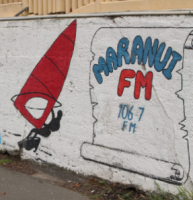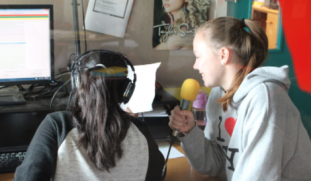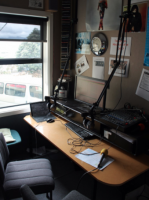Maranui FM was established at Lyall Bay School in 2008 with the support of the Ministry of Education and Enterprise New Zealand. The aim of the radio station was to provide an engaging, real life context for students to develop enterprising skills and behaviours.
After nearly ten years of radio broadcasting we catch up with staff and students at Lyall Bay School to learn how Maranui FM has helped to build learner agency, key competencies, and community connections.
Maranui FM and learner agency
At Lyall Bay School there is a small broadcasting studio nestled in the middle of a long corridor. In this studio you will find industrious students presenting radio programmes for their school radio station, Maranui FM. The room is a hive of activity as different groups of Year 5 and 6 students move in and out to manage their little slice of air time. Students work collaboratively to design the ideas and content for their programmes. The only requirement is that each group submits a script to their teacher, Mr Chalmers, the day before their broadcasting timeslot.
Maranui FM wasn’t always run this way. In the early years students were assigned a particular role for the radio station such as radio announcer, news researcher, or website manager, and ideas for content and delivery were largely teacher driven.
Getting rid of allocated roles and letting students decide the content for their own programmes has allowed for greater learner agency. Students can choose to be involved in a radio programme that matches their interests and take on roles that suit their strengths.
“The kids have much more agency in it. They take responsibility and choose what their shows are going to be about, choose who they are going to interview. They are doing the whole lot. The kids who are running the Animalia show have already written to Jacinda Ardern to ask for her support with animal rights.”
Clint Chalmers, Deputy Principal at Lyall Bay School
Examples of current programmes on Maranui FM include:
- Animalia – Students talk about animals and promote animal rights.
- Music around the world – Students share the languages, cultures, and music from other countries.
- The sports hour – Students talk sport and the latest results.
- The Beatles hour - Students share music by the Beatles.
- The Rita Angus hour – Students share older style music for residents of the local retirement village.
Giving students control over their roles has allowed some of the quieter students to give broadcasting a go. Teachers report that it is often the shy and quiet students who really shine on the radio.
“These quiet kids blossom. They can’t see their audience. They are talking to nothing but a microphone. You see a completely different side to them.”
Clint Chalmers, Deputy Principal
“The radio station has given me the confidence to speak out live. The more you do it the less afraid you get.”
Student
Effective pedagogy
The teachers running Maranui FM have created a supportive learning environment where students enjoy positive relationships with each other and are able to be active, visible members of the radio station community. Students can choose a role that they are interested in which gives them autonomy, ownership, and a greater sense of belonging to Maranui FM.
Return to top
Key competencies
Maranui FM provides the perfect context for the development of all five key competencies. Staff and students comment on the ways that the radio station brings the key competencies to life:
Thinking
“We make the decisions about our radio show. We decide what would make a good schedule, who we should interview, what we should talk about. We have to put in breaks at the right times. We have to fill the whole 45 minutes.”
Student
“It’s the kids’ baby. They come up with the ideas about what they want to do.”
Melanie Dean, Principal
Using language, symbols, and text
“When you are an announcer, you have to do all the controls. You are in charge of the sounds and turning the microphones off and on.”
Student
“We had to write a letter to get a spot on the radio station. The letter had to say why you wanted to be on the radio and why you should be allowed on. It had to be a proper letter.”
Student
Managing self
“The students plan and prepare for the show after school and during their lunch times. Hardly any class time is used apart from when they are on air. They have to get things ready on time. If their script isn’t ready then they can’t go on air.”
Clint Chalmers, Deputy Principal
“My buddy works on the songs and I work on the script.”
Student
Relating to others
“It requires collaboration. If someone isn’t doing their bit then it doesn’t work well. At the start of the year the Year 6 students train up the Year 5 students. They are the teachers.”
Clint Chalmers, Deputy Principal
“My buddy didn’t do any of the work so I had to do all the work. I told him how I felt. He is doing a little bit more now.”
Student
Participating and contributing
“You need to start your show at the right time and finish it so other people can go on. Otherwise you are using their time and that’s not fair on them.”
Student
“Younger children in the school can come up to the station and read stories and sing a song, or play instruments. They can tell their parents and grandparents that they are going to be on air.”
Melanie Dean, Principal
Key competencies
Participation in Maranui FM requires students to make use of and develop all five key competencies. Students are able to articulate the specific capabilities that they developing and explain why they are important.
Return to top
Community engagement
Maranui FM also helps the school build connections with parents, whānau, and communities.
The radio programmes are recorded as podcasts and uploaded to the Maranui FM website so family members and people in the community can access them anytime, anywhere. Younger students regularly visit the studio to broadcast their own stories and songs with the help of the Year 5 and 6 radio crew.
“It is a wonderful way to celebrate and share their learning. Grandparents and family members from New Zealand and overseas get in touch to tell us that they love hearing their children on the radio. It brings the local and global community into our space.”
Melanie Dean, Principal
The cultural diversity of the community is reflected in the radio programme with students speaking in their own languages about school events. Plans are underway to have the newsletter read out in different languages.
The school has a close relationship with the Rita Angus Retirement Village and a dedicated Rita Angus radio programme has been developed to meet the interests and needs of the retirement village residents. Students regularly survey the residents to find out what they would like to hear on the radio and alter the contents of their programme to suit.
Community engagement
Maranui FM brings the community engagement principle to life by connecting learning with students’ wider lives. The radio station offers a local, meaningful context for learning which has enabled the school to grow educationally powerful relationships with whānau, businesses, and the local retirement village.
Acknowledgements
Clint Chalmers, the lead teacher and driving force of Maranui FM, retired at the end of 2017. His expert guidance over the years has ensured the success and evolution of the radio station. The school would like to thank Clint for all the work he has put into developing Maranui FM to where it is today. We know he will be streaming in when he is relaxing during his retirement.
- Tags:
- community engagement
- effective pedagogy
- key competencies
- learning areas
- primary
Return to top



